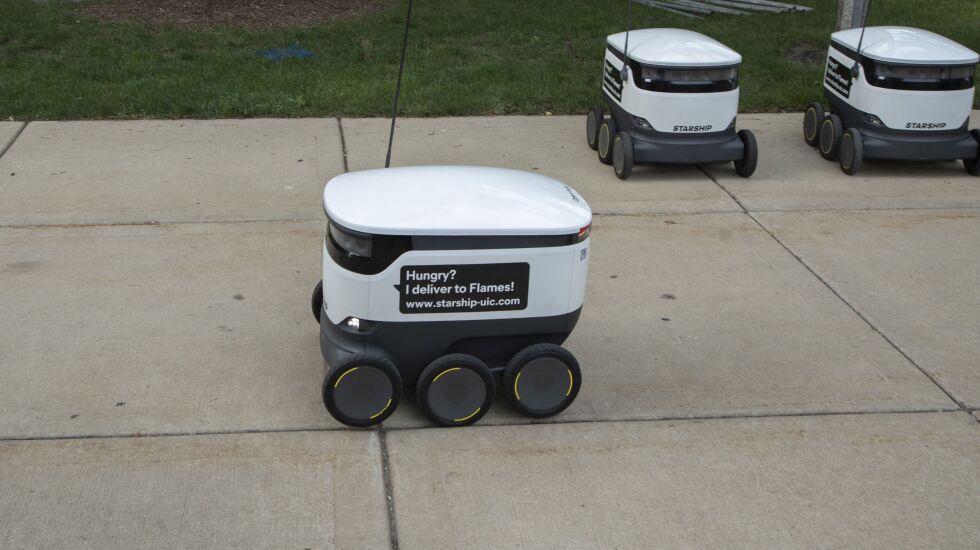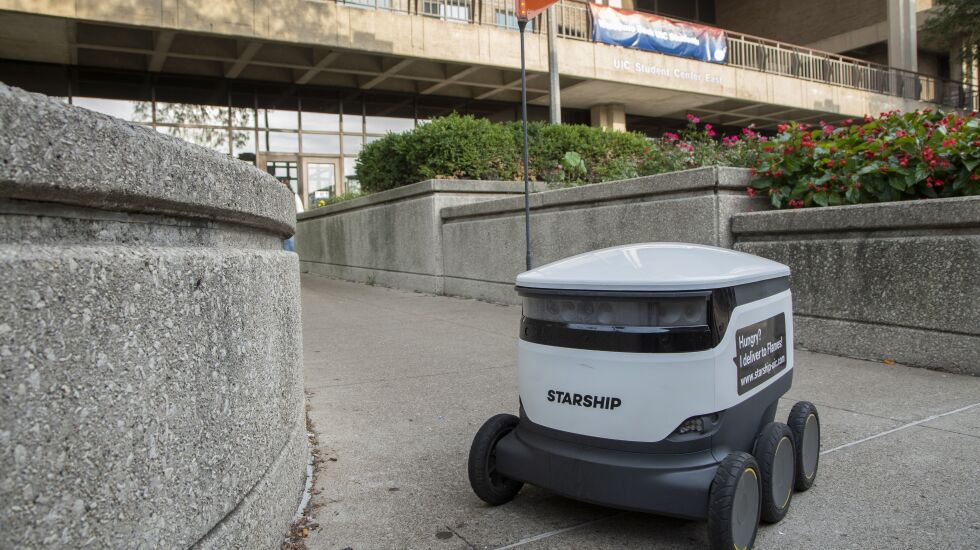
Robotic personal delivery devices described as “beverage coolers on wheels” will soon be delivering more restaurant meals and groceries in and around the campus of the University of Illinois Chicago.
Forging headfirst into the future of food delivery, the Chicago City Council’s Committee on License and Consumer Protection on Thursday approved an ordinance championed by Mayor Lori Lightfoot expanding a year-old, pandemic-inspired pilot that had been confined to just a portion of the UIC campus.
Starship Technologies was authorized to conduct a two-year pilot in an area bounded by Halsted Street, Ogden Avenue, Roosevelt Road and the Eisenhower Expressway.
Ryan Tuohy, chief communications officer for Starship Technologies, described the company’s robots as “beverage coolers on wheels.” They are confined to sidewalks and crosswalks.
Top speed is 4 mph “and only if there’s nobody around,” Tuohy said. “That’s the maximum limit they’re allowed to travel. ... And it’s a low-weight vehicle that’s 75 pounds, unladen. We don’t add much weight.”
To prove how safe and slow deliveries are, Tuohy played a video showing Ald. Nicole Lee (11th) and Ald. Howard Brookins (21st) watching a delivery, surrounded by UIC students.
“It’s a very risk-averse device that will wait until it’s absolutely safe to cross” a street, Tuohy told the committee, claiming 4 million deliveries worldwide for the Estonia-based company.
“Robots do not make high-risk decisions. They are much better at patience than humans. When in doubt, they wait.”
License Committee Chair Emma Mitts (37th), who attended a demonstration on the first day of school, marveled that the robots are “more intelligent than humans. They make sure it’s clear.”
To order food, customers download the app and type in the precise location, provided it is “within the geo-fence” — boundaries — of the pilot program. Once the order is placed, customers can watch as it makes its way to their location.
When it arrives, “you pop the lid, take your order, and you’re on your way,” Tuohy said. “Only the smart phone that paid for the goods is able to uniquely unlock the robot and get the goods out of the robot.”
John Coronado, vice chancellor of administrative services at UIC, said students, faculty and staff at the 34,000-student campus have enjoyed the “convenience and affordability” of robot deliveries.
“If you can recall what it was like to be on a college campus, it never really exactly was easy to have food delivery,” Coronado said. “With the Starship app ... the device comes right to you wherever you are,” he said.

When UIC forged its partnership with Starship, the pandemic was “still raging.” Robot deliveries helped alleviate “the sheer volume of students” descending on UIC dining halls, Coronado said.
The sanitation protocols also were important.
“The food goes into the device and directly to the students,” he said. “The devices have proven to be safe and reliable — even during the winter months.”
The expanded partnership will allow robots to serve the newly-opened academic and residential complex where 600 students are housed, he said.
“Unfortunately, if not given the opportunity to expand, it will become unfeasible for Starship to remain operating at UIC, which would greatly take away from student experience we have diligently worked to build,” Coronado said.
Charles Farrell, UIC executive director of business development, said the robots are delivering about 100 orders per week and after a slow start has been “very successful.” The campus has 20 robots, and if the full Chicago City Council approves the expansion, the plan is to add 10 more.
Al Pacelli owns Al’s Italian Beef, 1079 W. Taylor St., within the expanded test area, though he had not heard of the program until contacted by the Sun-Times.
Pacelli was taken aback at the mere thought of having a robot deliver his Italian beef sandwiches.
“It doesn’t sound reasonable. What if you’ve got to go upstairs or something. What if you have to take an elevator. Not everybody’s gonna meet you on the street. Are these things capable of doing that or going upstairs? It sounds like the Jetsons,” Pacelli said.
“When I deal with GrubHub, it’s all packaged. They’re there within so many minutes. They probably have a way keeping it warm. They’ve probably got containers that would keep it warm or cold, depending on what you’re delivering.”
Asked whether he would be open to trying robot delivery, Pacelli said: “Why not? We give everything a chance. That’s the way the world bounces. Try it out. And if it don’t work, I only lose a couple customers. I won’t lose a lot.”
If it works, the potential benefit of robots could be enormous, Pacelli said. For one thing, it’s a way to avoid third-party delivery fees that cut into profits, Pacelli said.
“They charge both of us. They charge the customer. They charge me, also. It’s up to 30% of our costs, which is very hard to deal with. But if you don’t do it, you don’t get them customers either. So, you work at a lower volume and hope you get a lot of volume,” Pacelli said.
“You don’t have to tip ’em either. Unless they put a tip in there. I don’t know who for. I know GrubHub, Uber and DoorDash — they put the tips right in there. Of course, it’s for a human.”
Joann DiBuono is a manager at Tufano’s Vernon Tap, 1073 W. Vernon Park Place, in the pilot area.
DiBuono said the family-owned restaurant has no need for any food delivery service. If a customer orders a meal, it’s carry-out only.
“We’re busy in the restaurant. And those types of orders are small. They’re just kind of like disruptive,” she said.
“We get calls all the time from all kinds of delivery services. And we will not get involved with them. … We only did it during COVID. And once we were able to come in again, we stopped it. So it really has nothing to do with us. Our bartenders do the take-outs. And they’re busy. They come in and out. We don’t have the help to deal with anything like that.”
She added, “It’s very disruptive having those services in a restaurant like ours. I could go a little further. But I think it’s better if I don’t. … It was a lot of different people walking into the restaurant. … We’ve been here for 92 years. It’s kind of like, if it’s not broken” don’t fix it.
Illinois Restaurant Association President Sam Toia said he’s been assured robot food deliveries currently confined to the UIC campus will be strictly regulated.
Toia has also assurances the robots will be inspected by the Chicago Department of Public Health to make certain the futuristic devices are capable of keeping cold food cold and hot food hot.
Even so, Toia said he still has concerns.
“They told me the health department is working with these robot companies. We will see. Our concern is always the safety and health of our customers. Their answer was, `They’re doing it in Madison. They’re doing it in San Francisco. They’re doing it in Washington, D.C. And we have not seen any problems with food-borne illness.’
“... I said, `I’ll listen to doing a pilot program. Let’s see how this works.’ But, I’m gonna keep a very close eye on this. This could be cheaper than using third-party delivery. But I’m not sure yet.”
Contributing: Emmanuel Camarillo







